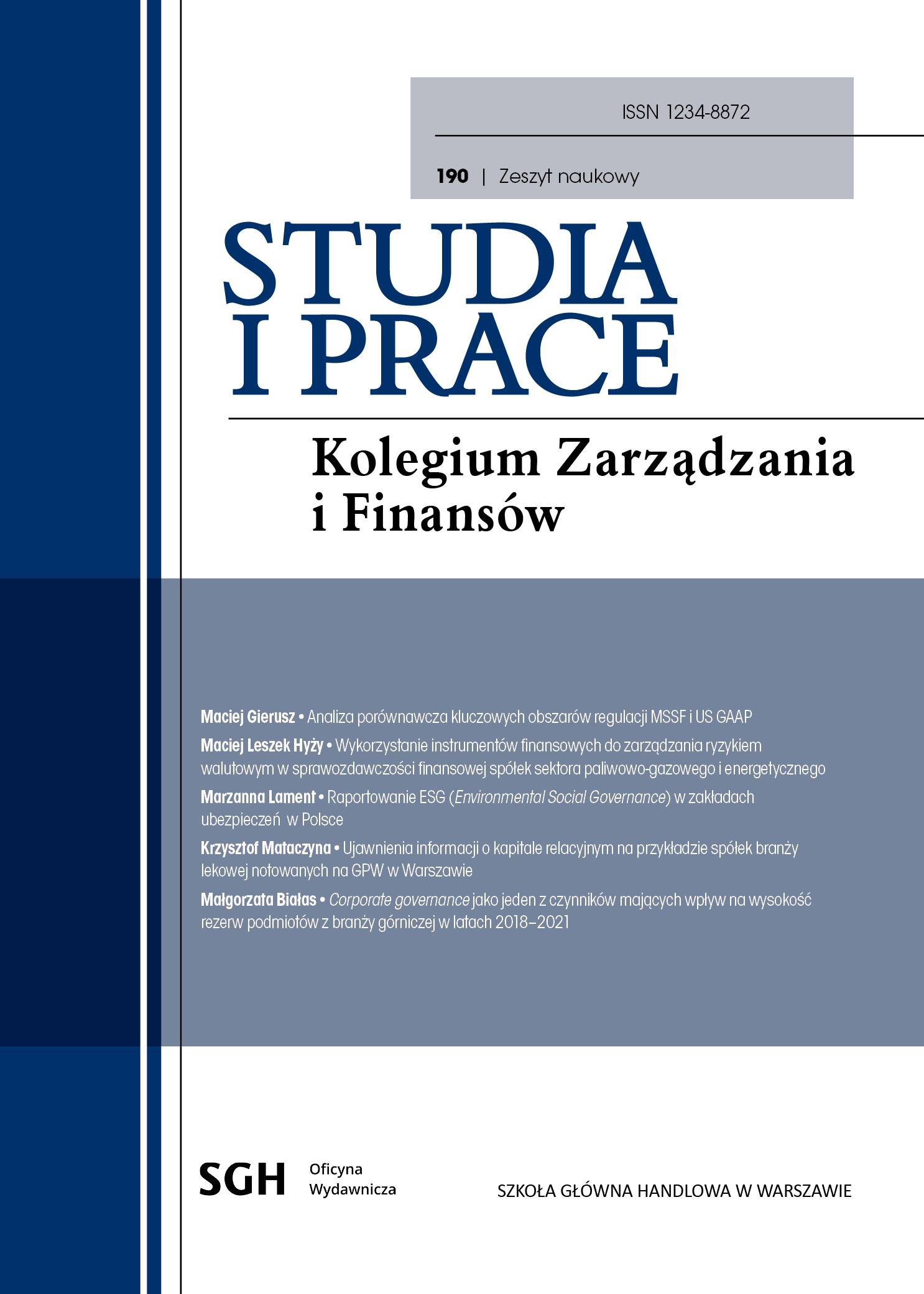Corporate governance as one of the factors affecting the amount of provisions among entities from the mining industry in 2018–2021
DOI:
https://doi.org/10.33119/SIP.2023.190.5Keywords:
balance sheet provisions,, corporate governance,, agency theory,, mining industryAbstract
Provisions created for future liabilities are the subject of this paper. The research was conducted on the basis of separate financial statements of entities from the mining industry, which are obliged to reclaim mining areas after the end of their operations. The aim of the article is to determine whether corporate governance has an impact on the amount of provisions created in the mining industry. In particular, attempts were made to verify whether the value of created provisions depends on who owns a given mining company. In addition, thanks to the collected data, it will be possible to determine how these enterprises prepare for future liabilities by creating provisions. Has the Covid-19 pandemic also had an impact on changes in this area?
Downloads
References
1. Ustawa o rachunkowości, Dz.U. z 1994 r. nr 121, poz. 591 z późn. zm.
2. Ustawa Prawo geologiczne i górnicze, Dz.U. z 2011 r. nr 163, poz. 981 z późn. zm.
Wydawnictwa zwarte
1. Aluchna M. [2007], Mechanizmy Corporate Govenrance w spółkach giełdowych, Wydawnictwo SGH, Warszawa.
2. Cadbury A. [1992], Report of the Committee on the Financial Aspects of Corporate Governance, The Committee on the Financial Aspects of Corporate Governance, London.
3. Clarke T. (red.) [2004], Theories of Corporate Governance. The Philosophical Foundations of Corporate Governance, Routledge, London–New York.
4. Gmytrasiewicz M., Kierczyńska U. [2007], Rezerwy w rachunkowości i podatkach, Difin, Warszawa.
5. Messner Z. (red.) [2004], Rachunkowość finansowa, Wydawnictwo Akademii Ekonomicznej w Katowicach, Katowice.
6. Niemczyk R. [2007], Księgowanie rezerw, Wydawnictwo AD. Drągowski SA, Warszawa.
7. OECD [1999], Principles of Corporate Governance, Paris.
8. Olchowicz I. [2011], Rachunkowość podatkowa, Difin, Warszawa.
9. Rezaee Z. [2009], Corporate Governance and Ethics, Wiley, Hoboken.
Artykuły prasowe i okolicznościowe
1. Acar E., Ozkan S. [2017], Corporate Governance and Provisions Under IAS 37, „EuroMed Journal of Business”, 12.
2. Aluchna M. [2008], Dobre praktyki corporate governance. Światowe tendencje a polskie doświadczenia, „e-mentor”, 2(24).
3. Eisenhardt K.M. [1989], Agency Theory: An Assessment and Review, „Academy of Management Review”, 14(1).
4. Gierusz B., Mazurowska M. [2020], Rola rezerw bilansowych w kształtowaniu kondycji finansowej przedsiębiorstwa, „Zeszyty Teoretyczne Rachunkowości”, 106(162).
5. Jensen M.C. [1994], Self-interest, Altruism, Incentives and Agency Theory, „Journal of Applied Corporate Fiance”, vol. VII, no. 2.
6. Larcker D.F., Tayan B. [2011], Seven Myths of Corporate Governance, Rock Center for Corporate Governance at Stanford University Closer Look Series: „Topics, Issues and Controversies in Corporate Governance”, no. CGRP-16, June.
7. Mesjasz Cz. [2013], Problemy terminologiczne teorii i praktyki corporate governance, „Studia Ekonomiczne”, nr 141 Governance-korporacje, instytucje publiczne, sieci, Katowice.
8. Poniatowska L. [2004], Klasyczne rezerwy rachunkowości i bierne rozliczenia międzyokresowe – część I, „Monitor Rachunkowości i Finansów”, nr 9, cyt. za: A. Kamela-Sowińska, Rezerwy, w: Zaawansowana rachunkowość finansowa – wybrane zagadnienia, red. A. Kamela-Sowińska, Wydawnictwo Wyższej Szkoły Handlu i Rachunkowości, Poznań 2010.
9. Poniatowska L. [2013], Rezerwy na zobowiązania jako instrument polityki bilansowej, „Zeszyty Naukowe Uniwersytetu Szczecińskiego nr 757. Finanse, Rynki Finansowe, Ubezpieczenia”, 58.
10. Poniatowska L. [2014], Polityka rachunkowości w zakresie rezerw na zobowiązania i jej znaczenie w kształtowaniu wyniku finansowego, „Studia Ekonomiczne”, 201.
11. Shleifer A., Vishny R. [1997], A Survey of Corporate Governance, „Journal of Finance”, 52(2).
Materiały internetowe
1. Białas M. [2022], The Use of Estimated Values to Implement the „Big Bath” Strategy During the COVID-19 Pandemic on the Example of Selected Enterprise, „Central European Review of Economics & Finance”, 36(1), https://doi.org/10.24136/ceref.2022.001 dostęp: 20.03.2023.
2. https://ekrs.ms.gov.pl/, dostęp: 25.03.2023.
3. https://stat.gov.pl/, dostęp: 13.04.2023.
4. https://www.emis.com/pl, dostęp: 20.03.2023
5. Marcinkowska M. [2014], Corporate governance w bankach. Teoria i praktyka, Wydawnictwo Uniwersytetu Łódzkiego, Łódź, http://dx.doi.org/10.18778/7969-059-6, dostęp: 10.04.2023.
6. Todd A. [2010], Corporate Governance Best Practices, w: Corporate Governance. A Synthesis of the Theory, Research, and Practice, red. H.K. Baker, R. Anderson, John Wiley&Sons, Inc., Hoboken, https://doi.org/10.1002/9781118258439.ch4, dostęp: 10.03.2023.









